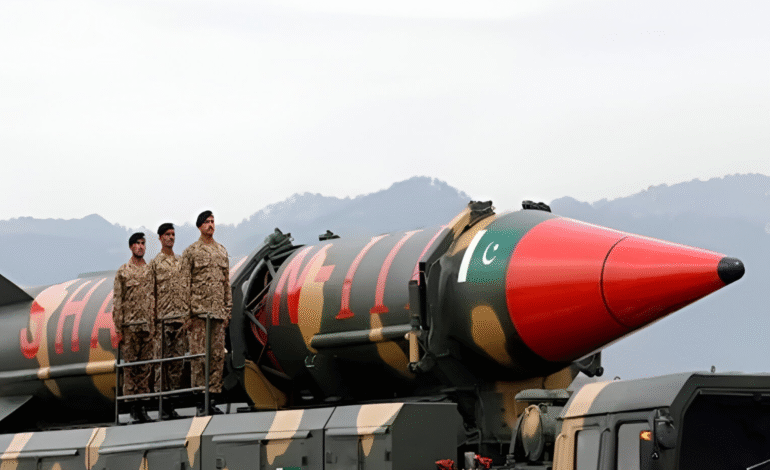Will Pakistan Launches Missile against India?

The South Asian region once again finds itself under intense global scrutiny following Pakistan’s confirmation of a successful training launch of its Abdali Weapon System. The surface-to-surface missile, boasting a range of 450 kilometers, was test-fired on Saturday. According to an official statement from the Pakistani military, the launch aimed to ensure operational readiness and validate key technical attributes, including enhanced navigational precision and maneuverability. Though presented as a training exercise, the broader geopolitical climate renders the timing and implications of the test particularly significant.
The launch closely follows a tragic event in Indian-administered Kashmir, where an attack on April 22 claimed the lives of 26 civilians. India has attributed the incident to Pakistan-backed militants, a claim that Islamabad has categorically denied. Meanwhile, along the Line of Control (LoC), the de facto border between the two nations, Indian defense sources have reported nine consecutive nights of gunfire exchanges. Against this backdrop, Pakistan’s missile launch has been widely interpreted as a calculated display of military readiness during a period of heightened tension.
The Kashmir Attack and Its Immediate Consequences
The deadly assault that triggered the renewed hostility occurred in Pahalgam, a picturesque region in Indian-administered Kashmir. Armed militants ambushed Hindu tourists in the Baisaran Valley, resulting in 26 fatalities and multiple injuries. Indian intelligence services quickly pointed to involvement by Pakistan-based elements. While the Resistance Front initially claimed responsibility, it later distanced itself from the attack, adding complexity to the unfolding investigation.
Eyewitness accounts revealed that the attackers allegedly targeted individuals based on religious identity. One local Muslim man, who offered pony rides to tourists, was reportedly killed while trying to shield the victims. His bravery has been acknowledged by both communities as a symbol of humanity amidst tragedy. In response, Indian security forces launched an extensive crackdown across the region, intensifying counterinsurgency operations and detaining several suspects. These actions have simultaneously drawn praise and criticism, further polarizing public opinion within Kashmir.
India’s Firm Response and Diplomatic Retaliation
Following the attack, Indian Prime Minister Narendra Modi convened a high-level national security meeting and announced that the military had been given “full operational freedom” to respond. India swiftly escalated its measures against Pakistan, suspending visa processing for Pakistani nationals, halting cross-border trade, and revoking overflight privileges for Pakistani aircraft. New Delhi also began the formal process of revisiting its participation in the Indus Waters Treaty, a historic bilateral agreement that has long endured even amid past conflicts.
Additional retaliatory actions included expelling Pakistani diplomats and imposing strict restrictions on cross-border information flow. Social media channels linked to Pakistan were blocked, and online content perceived as inflammatory was censored. Domestically, these moves were largely applauded as a strong show of national resolve. However, critics abroad voiced concern over the potential for escalation and questioned whether such punitive actions might hinder long-term diplomatic resolutions.
Pakistan’s Denial and Strategic Messaging
In contrast, Pakistan has consistently denied any involvement in the Kashmir attack and has accused India of using the incident as a pretext for political and military aggression. Pakistan’s Ministry of Foreign Affairs described India’s allegations as “baseless” and claimed that they were intended to distract from domestic unrest and human rights concerns in Kashmir. Furthermore, Pakistani officials revealed that they had received credible intelligence suggesting that India was planning a military strike, prompting Islamabad to raise the issue with global bodies including the United Nations and the Organisation of Islamic Cooperation.
Seen in this light, the Abdali missile test appears to be part of Pakistan’s broader strategy to assert deterrence and reinforce its defensive posture. By showcasing its technological capabilities and military preparedness, Islamabad aims to dissuade any aggressive moves from its eastern neighbor. Though such demonstrations are not new to the region’s security dynamics, they nonetheless add to the already fragile situation and raise the stakes in an environment where one misstep could have catastrophic consequences.
International Reactions and Calls for Restraint
The international community has expressed deep concern over the increasing volatility. U.S. Secretary of State Marco Rubio urged both countries to de-escalate and engage in direct dialogue. The European Union echoed this sentiment, while China offered to mediate the dispute, citing its vested interests and cordial relations with both nations. Additionally, Pakistan has sought diplomatic support from Middle Eastern allies such as Saudi Arabia and the UAE, appealing to their influence to press India toward restraint.
Despite these international appeals, the situation on the ground continues to deteriorate. Reports indicate that both India and Pakistan are reinforcing their military presence along the LoC, deploying surveillance drones, mobilizing troops, and relocating artillery. While some diplomatic backchannels remain open, no formal peace initiatives have materialized. The United Nations has offered to mediate and reminded both nations of their obligations under international law to avoid actions that could escalate the conflict further.
Digital Narratives and Public Sentiment
Beyond the military and diplomatic arenas, a fierce propaganda war is unfolding on digital platforms. Indian authorities have restricted access to Pakistani social media content, suspended the account of Pakistan’s Defense Minister on X (formerly Twitter), and geo-blocked several YouTube channels seen as promoting hostile narratives. These actions form part of a broader effort to control the public discourse and limit external influence over domestic sentiment.
Conversely, in Pakistan, trending hashtags like #FalseFlag and #BlameGame have dominated social media, with users alleging that the Kashmir attack was orchestrated by Indian agencies to justify heavy-handed measures. These online narratives have further hardened public sentiment, reducing the likelihood of political reconciliation. The surge in nationalistic fervor on both sides is pressuring leaderships to adopt more aggressive postures, leaving little room for moderation or compromise.
The Strategic Significance of the Abdali Missile
The Abdali missile is part of Pakistan’s Hatf series and is classified as a short-range ballistic missile, designed for tactical operations on the battlefield. Its relatively limited range of 450 kilometers positions it within Pakistan’s strategy of deterrence by denial, which seeks to neutralize an adversary’s conventional military advantages through rapid and precise retaliation. Enhanced navigation and maneuverability make the Abdali a credible asset in this doctrine, allowing it to evade interception and strike specific targets effectively.
Experts suggest that the choice to test this specific missile—rather than a longer-range system—was intentional. It demonstrated capability without provoking an international crisis. However, even such calibrated demonstrations of strength carry inherent risks. In a climate charged with mutual suspicion, any military move is susceptible to misinterpretation, thereby amplifying the potential for unintended escalation.
Civilian Impact and Regional Fallout
While political leaders engage in rhetorical and military exchanges, ordinary citizens on both sides of the LoC bear the brunt of the conflict. Continued cross-border shelling has forced many families to flee their homes, disrupted daily life, and inflicted civilian casualties. Economic disruptions are also becoming apparent, particularly in Kashmir, where cross-border trade forms a crucial part of the local economy. The breakdown of commerce and transportation has led to job losses and rising inflation in border areas.
A looming concern involves the potential collapse of the Indus Waters Treaty, which could significantly impact agricultural productivity and water access for millions of people in both India and Pakistan. Experts warn that water scarcity, exacerbated by climate change, could become the next flashpoint in the region if the treaty’s framework is undermined. International humanitarian organizations have urged both countries to prioritize civilian protection and create humanitarian corridors, but their calls have largely gone unanswered amidst the ongoing crisi







